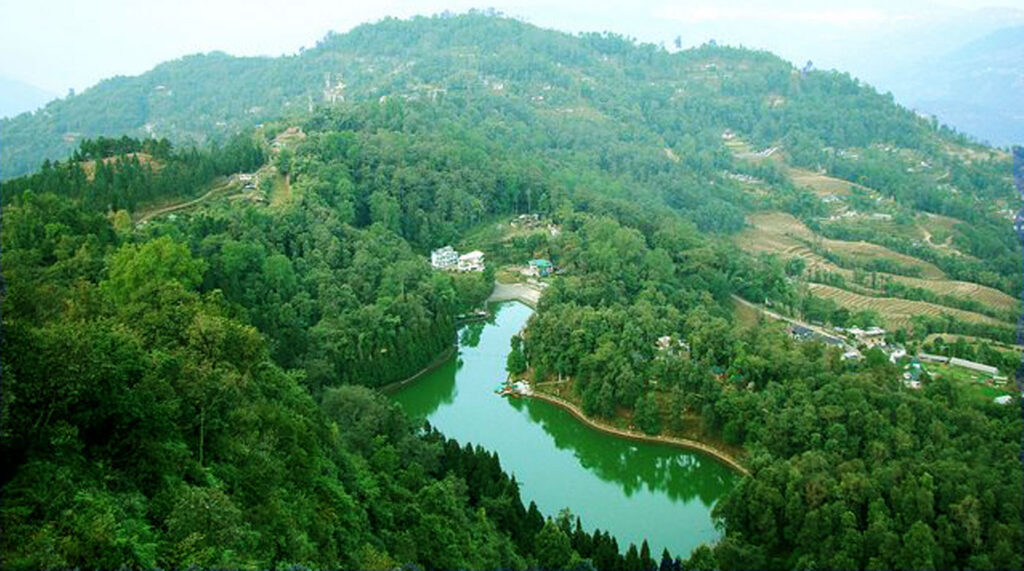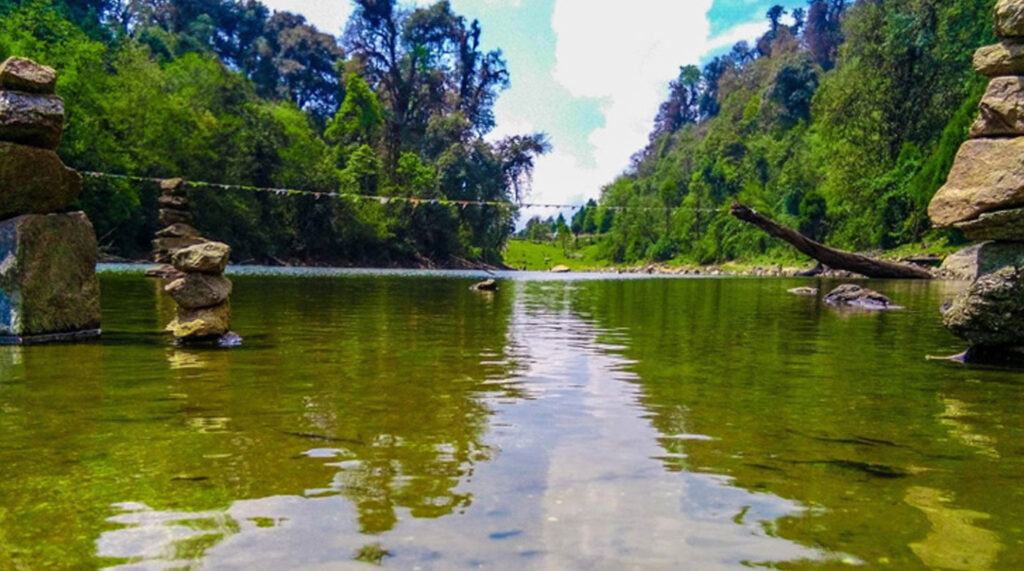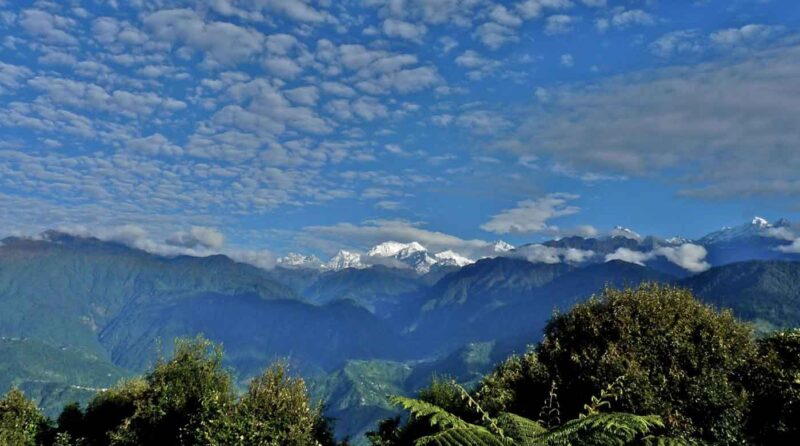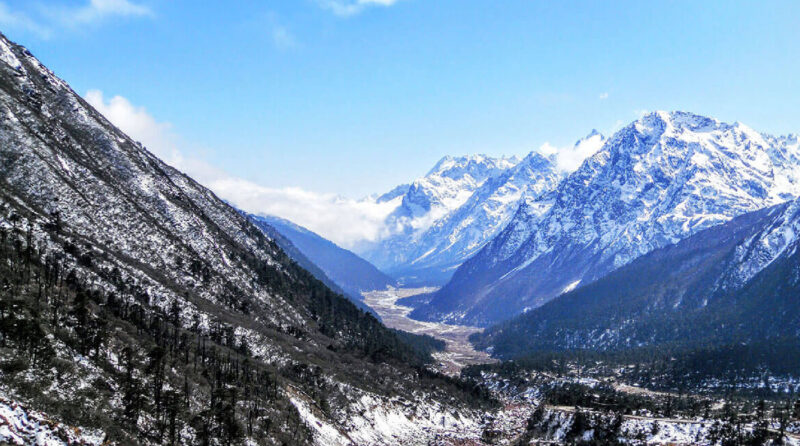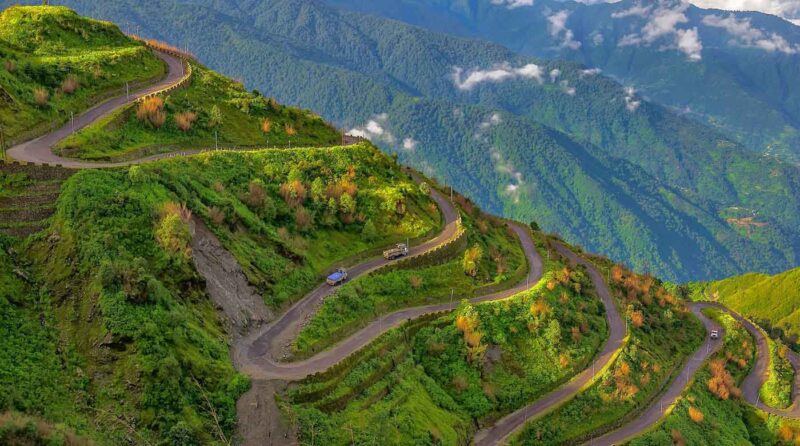Pelling sightseeing places An architecturally defined town, Pelling and its...
Read more...Aritar
Located in East Sikkim, Aritar is a hilltop station and borders West Bengal. A breathtaking view of Khangchendzonga only adds to the many natural riches that Aritar is blessed with. Lush green forests, sweeping hills of paddy fields and placid lakes hidden inside deep forests makes it a perfect destination for those in search of nature trails and a serene holiday.
The Lampokari Lake in Aritar is surrounded by lush greenery and is one of the oldest in Sikkim. This lake is the only lake with boating in Sikkim. A short walking trail uphill leads you to Mankhim Dara, where a temple dedicated to the ethnic Rai community is located. Mankhim offers a 360 degree view of the surrounding areas. Don’t miss Mankhim while here. The Aritar Gumpa is one of the oldest monasteries in Sikkim belonging to the Karma Kagyu lineage order of Tibetan Buddhism.
Aritar hosts the Lampokhari Tourism Festival during end of March and early April conciding with Ram Navami. There is leisurely boating in the Lampokhari Lake, horse riding around the Lake, traditional archery competition and short treks to nearby hilltops and viewpoints. The festival offers visitors traditional cultural shows, flower exhibition and local ethnic cuisine to tickle your taste buds.
Mulkharka
Mulkharka, the land aesthetic beauty, is the last village near Aritar and lies in West Bengal. Mulkharka lies in the edge of the great Neora Valley National Forest. Phusrey Lake, atop Mulkharka, is one of the sacred lakes there. It is situated few miles away from Aritar taking some 30 mins drive to reach some of the homestays.
Phusrey Lake is renowned for is spirituality and sacred nature of the lake. Amidst the dense forest where chirping of birds echoes the serene atmosphere, it is believed that birds take away any leaves falling into the lake. It captivates the soul of locals with aesthetic sensation. One can enjoy the peaceful, lush green verdant hills and spectacular atmosphere of this lake.
Phusrey in also known for the wish fulfilling sacred lake. It is believed that here, deity fulfills whatever you ask for. Lake is surrounded by such wish fulfilling stone pyramids. Also, one of the unique features of this lake is the “Half Drowned Tree”, which lies in the middle of the lake, almost half submerged into the water. This tree has been drooping there since many decades, but the mystery is that neither the tree is growing nor it is decaying. Water here is believed to have some extraordinary composition because of which, no one enters the lake or touches its water.
The term Phusrey in colloquial means grayish or dull in colour, The Lake which is surrounded by verdant is usually grey and dry due to the freezing mists; hence, in the due course the lake may have evolved with the term Phusrey. Mulkharka, a place located near Phusrey Lake is indeed an exquisite example of nature’s beauty and an ideal place for trekking and camping. The place is usually engulfed with mists and fogs, where chilly gusts of wind with the taste of rain blow over the place. Mulkharka, is a local Nepali term meaning Pasture for grazing herd. A vast stretched area of land mostly covered with verdant facilitates fodder for the herds. Cattles grazing all over the pasture, with the singing of herdsman from distant echoing is the usual pictures one confronts with.
How to Reach Aritar?
By Air
Although recently, Sikkim has got its own airport at Pakyong, but due to commercial viability, only a few flies to it. It would be just 90 mins drive from Pakyong Airport to Aritar.
The nearest airport is Bagdogra Airport (IXB), located approximately 118 km from Aritar. Bagdogra airport is connected to all the major cities of India like Delhi, Mumbai, Bangalore, Kolkata, Chennai, etc with daily non-stop flights. From Bagdogra, or Siliguri, you can hire a private vehicle that will get you to Aritar in a matter of 4 hours.
By Train
The nearest railway station to Aritar is New Jalpaiguri (NJP), about 112 kilometres away. The station, which is 20 mins drive from Siliguri, is the gateway for all Sikkim, Darjeeling and Bhutan. It is well-connected to major cities like Kolkata, Chennai, Bangalore, Mumbai and New Delhi.
From New Jalpaiguri, you can reserve a taxi to Aritar or go to Siliguri Bus Station and catch a state-run bus to Rangpo and then hire a taxi to Aritar.
By Road
Aritar is connected by road to Siliguri. Only 2 or 3 shared taxis are available from Siliguri to Aritar each day which leaves Siliguri between 12:00 noon to 2:30 pm only. Guest traveling on other time schedule have to reserve the vehicle to reach Aritar.
Location
Things you need to Know About Aritar
Elevation
4,915 feet above mean sea level
Temperature Range
3 °C in January - 25 °C in June
Local Language
Nepali, Hindi and English
Food
Indian, Chinese and Authentic Tibetian cuisines.
Festivals
Dusherra, Diwali, Losar, Holi, and Christmas
Religion
Hinduism, Buddhism and Christianity
Do you know?
Amazing Facts about Aritar
British-Built Bungalow
There is a bunglow called Dak Bunglow in Aritar built by the Britishers in 1895. It is built by Sir James Claude White (first political officer of Sikkim during British rule in India) in the year 1895.
Aritar Gumpa
A monastery of the Kagyuapa order, considered as one of the holiest and oldest in Sikkim. It is famous for monastic arts reflected in its traditional architecture, carved & painted murals and treasure of manuscripts and icons.
Viswa Vinayaka Mandir
This massive religious mandir at Rhenock, a nearby bazar from Aritar, is famous for Hindu that accords 51 faces of Lord Ganesha, with 12 feet each; 16 of them placed at corridor towards temple’s main entrance
Hareshwar Shivalaya Mandir, Lingsey
Hareshwar Shivalay Mandir in Lingsey, a nearby place from Aritar is a pre-independence mandir and sanskrit college that houses entire book range of Hinduism along with hand written Rig Veda, one among the only 4 found in India
Best time to visit Aritar
Expected tourist footfall
January
February
March
April
May
June
July
August
September
October
November
December
From mid March till June, Aritar experiences pleasant weather during the summer season. The temperature hovers 18°C to 25°C during the season. It is the best time to visit if you would like to escape the heat.
From July till September, monsoons causes swift rainfall, many a time causing landslides and road blockage. This is not the best time to visit. However, monsoon tourism is something to look upon if you enjoy rain. Monsoon Tourism in Mulkharkha/Aritar is famous for letting tourist experience of ploughing terrain field and paddy cultivation.
From October till March, winter is the best time for travelling to Aritar. The temperature ranges between 1°C and 7°C during the season. It is the perfect time to visit for the spectacular view of the snow capped mountains. Snow adventures, vibrant festivals and bone chilling cold makes perfect time to visit to Aritar/Mulkharka
Glimpse of Aritar and Mulkharka in pictures
[smartslider3 slider=7]
Book Tour packages with Aritar/Mulkharka
[wp_show_posts id="4258"]
Need help in tour planning?
Get FREE tour consultation and itinerary planning !
Cool ! We got it.
We will call you back at {{phone_number}} shortly
1
1
0%
https://greenfieldholidays.com/wp-content/plugins/nex-forms-express-wp-form-builder
false
message
https://greenfieldholidays.com/wp-admin/admin-ajax.php
https://greenfieldholidays.com/aritar-mulkharkha
yes
1
why book with us?

Lowest Price Guaranteed

Best Reviewed Organization

Customized Packages

Excellent Service

Safety & Security
Call Back
1
1
https://greenfieldholidays.com/wp-content/plugins/nex-forms-express-wp-form-builder
https://greenfieldholidays.com/wp-admin/admin-ajax.php
https://greenfieldholidays.com/aritar-mulkharkha
1
Other popular Destinations
Our Famous Blogs that may interest you
[wp_show_posts id="3683"]

